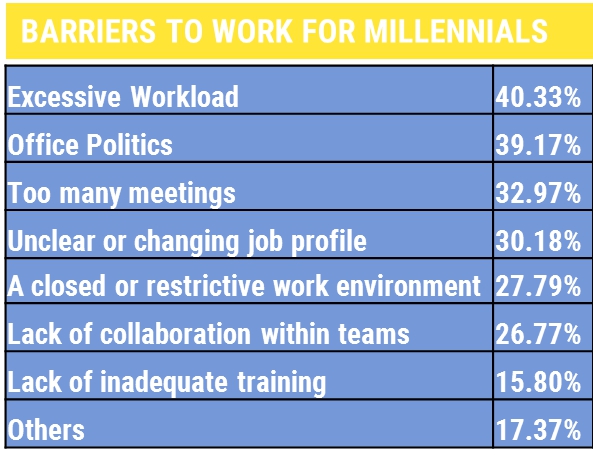HBR Ascend suggests four skills that can increase Gen Y’s productivity and efficiency at work.
Millennials are a completely different clan at the workplace. What motivates their predecessors to perform is a little too far-fetched for them.
They have their own set of rules and preferences.
According to a study at HBR Ascend, the primary reason that comes in the way of the millennials’ effective performance is ‘excessive workload’. In a survey of 1675 millennials, 40.33 per cent respondents claimed that excessive workload is their top barrier to work. The skew seems to be higher in the age group of 25–34, while the younger lot (18–24 years) feels office politics is a huge deterrent.
Between men and women of the millennial generation, the women (46.36 per cent) rate office politics as a big hurdle, while the men (43.07 per cent) crib more about excessive workload.
The third important reason for low productivity as pointed out by the millennials is, ‘too many meetings’.
However, all said and done, millennials are quite confident of the technical skills needed to do their jobs.
HBR Ascend suggests that this generation should learn the softer skills required to do a job better and also obtain the following four abilities:
Emotional intelligence
As the work environment gets even more difficult, individuals need to develop resilience. This increases the importance of emotional intelligence. However, around 87 per cent of the respondents do not agree with this belief. Only 13 per cent of the respondents felt that emotional intelligence was an area of strength for them.
Ability to manage stress
According to HBR Ascend it is important for this generation to learn to manage stress, especially to exist in a VUCA world (volatility, uncertainty, complexity, and ambiguity).
Persuasiveness
This is one important criterion to be successful at work and people across ages have believed or acknowledged this. The ability to persuade, influence, and manage diverse people has always been a crucial skill set. HBR Ascend believes that learning persuasion early on in their careers will also help the millennials become more collaborative leaders in the future.
However, the survey shows that only 4.5 per cent of respondents agreed that they had the persuasion skills needed to be successful at the workplace. Given that most millennials receive little to no formal training in this regard, it’s not surprising to see this as a challenge.
Analytical thinking
As the younger workforce continues to operate in a complex environment, they will need to sharpen their analytical thinking. Only 8.5 per cent respondents felt that this is an area of strength for them. People with high analytical thinking can break down and solve complex problems in a methodical way. It’s fair to assume that business complexity will only increase and it would only be beneficial to develop this capability. In addition, this is a crucial skill to cultivate to better understand and implement data capabilities.




1 Comment
I agree to the point of view. The Digital Thinking should be balanced with Emotional Thinking.